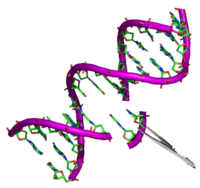
Photo from wikipedia
Phytochelatin synthase (PCS) is an enzyme that synthesizes phytochelatins, which are metal-binding peptides. Despite the important role of PCS in heavy metal detoxification or tolerance, the functional role of PCS… Click to show full abstract
Phytochelatin synthase (PCS) is an enzyme that synthesizes phytochelatins, which are metal-binding peptides. Despite the important role of PCS in heavy metal detoxification or tolerance, the functional role of PCS with respect to other abiotic stresses remains largely unknown. In this study, we determined the function of Arabidopsis thaliana phytochelatin synthase 2 (AtPCS2) in the salt stress response. Expression of AtPCS2 was significantly increased in response to 100 and 200 mM NaCl treatment. AtPCS2-overexpressing transgenic Arabidopsis and tobacco plants displayed increased seed germination rates and seedling growth under high salt stress. In addition, transgenic Arabidopsis subjected to salt stress exhibited enhanced proline accumulation and reduced Na+/K+ ratios compared to wild type plants. Furthermore, decreased levels of hydrogen peroxide (H2O2) and lipid peroxidation were observed in transgenic Arabidopsis compared to wild type specimens. Salt stress greatly reduced transcript levels of CuSOD2, FeSOD2, CAT2, and GR2 in wild type but not transgenic Arabidopsis. Notably, levels of CAT3 in transgenic Arabidopsis were markedly increased upon salt stress, suggesting that low accumulation of H2O2 in transgenic Arabidopsis is partially achieved through induction of CAT. Collectively, these results suggest that AtPCS2 plays a positive role in seed germination and seedling growth under salt stress through a series of indirect effects that are likely involved in H2O2 scavenging, regulation of osmotic adjustment and ion homeostasis.
Journal Title: Journal of plant physiology
Year Published: 2019
Link to full text (if available)
Share on Social Media: Sign Up to like & get
recommendations!